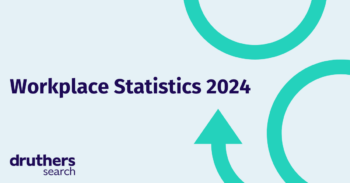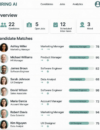
Gender
- Women hold less than a quarter of the world’s board seats (23.3%)
- Since 2022, the number of women on boards has risen 3.6%, however, is unlikely that gender parity on boards will be reached before 2038—and possibly later.
- Only 6% of CEOs in the world are women, representing just a 1% increase from 2022. At the current rate of change, global parity for CEOs wouldn’t be reached until 2111.
- For every £1 earned by a man in the UK, an equally qualified woman with a similar personal and professional background earns 90p on average. The gap increases as roles become more senior.
- According to the Tech Talent Charter, 1 in 3 women in tech are already planning to leave their job. On top of this, if companies are discarding their DEI work, gender diversity in tech will be set up for decline. All the while reports highlight that the gender pay differences are worsening, and BCS warned that it will take 300 years to close the gender pay gap in tech.
- For every 100 men promoted to managerial roles, only 81 women are promoted to the same roles. This phenomenon is even worse for women of colour, who represent only 7 percent of current C-suite positions—just a four-percentage-point increase since 2017.
- Companies with women as CEOs have a higher percentage of balanced boards (35.3%) compared to men (23%).
Ethnicity
- As of the third quarter of 2024, the unemployment rate for people of white ethnicity in the United Kingdom was 3.6%., the lowest of the provided ethnic groups. By contrast, the unemployment rate for people in the mixed ethnic group was 13.9%.In the US, Black people make 76 cents to white people’s dollar.Ethnic minority employees hold only 1 in 16 top management positions in the UK.
- The Parker Review said there were now 12 ethnic minority chief executives in the FTSE 100, up from 7 in 2022. But overall only 13% of senior management at the top 100 firms were ethnically diverse.
- Black founders in the U.S. raised 0.48% of all venture dollars allocated last year. That’s around $661 million out of $136 billion, according to the latest Crunchbase data. 1.5% is given to Latino founders, and only 0.1% is given to Black or Latina women-founded teams.
- The amount of funding varies wildly too; the average start-up of a white male founder received over $210 million in total funding, while the average start-up of an underrepresented founder received a mere 43% of that – $91.1 million.
- Catalyst found that two-thirds of workers from marginalized racial and ethnic groups in Australia, Canada, New Zealand, South Africa, the United Kingdom, and the United States have encountered racism in the workplace at some point in their careers, and half have experienced racism in their current jobs.
LGBTQ+
- When applying for jobs, nearly a quarter (23.7%) of LGBTQ+ Americans have experienced discrimination based on sexual orientation or gender identity.
- In the European Union, 19% of LGBTQ+ men and 21% of LGBTQ+ women experienced discrimination at work in 2019, but transgender employees specifically reported much higher proportions of discrimination (36%).
- The technology sector, in particular, demonstrates a stark underrepresentation of LGBTQ+ individuals. According to statistics, only 2-3% of the tech workforce identifies as LGBTQ+. This underrepresentation can perpetuate a cycle of invisibility, where aspiring LGBTQ+ professionals lack role models and mentors who share their experiences.
- Many employees reported engaging in behaviours to avoid discrimination and harassment, including hiding their LGBTQ+ identity and changing their physical appearance. Nearly half (46%) of LGBTQ+ employees said that they are not open about being LGBTQ+ to their current manager, and one-fifth (21%) are not out to any of their coworkers.
- One-third (33%) of LGBTQ+ employees reported that they had left a job at some point in their lives because of how they were treated by their employer based on their sexual orientation or gender identity.
- Almost three-quarters (72%) of LGBTQ+ employees reported that they heard negative comments, slurs, or jokes about LGBTQ+ people at work at some point in their lives.
Neurodiversity
- It is estimated that around 1 in 7 people (more than 15% of people in the UK) are neurodivergent, meaning that the brain functions, learns and processes information differently. This number is quoted by some sources to be as high as 30%.
- Among disabled people in the UK, Autistic adults have the lowest employment rate, with only 3 in 10 in employment.
- Just 38% of companies surveyed this year by the CIPD say their organisation provides meaningful support to neurodivergent individuals. And only just over half say they would feel comfortable asking for support or adjustments at work, despite the survey showing that they are 50% more likely to feel exhausted and 35% more lonely at work than a neurotypical person.
- According to ADD.org, ADHD at work results in 1 out of 3 people with ADHD being unemployed at any time.
- Research suggests that teams with neurodivergent professionals in some roles can be 30% more productive than those without them.
- Different ways of thinking increase innovation. SAP reported that one of their neurodivergent employees developed a technical fix that saved the company an estimated $40 million.
Disability
- Latest UK government stats show that nearly 1 in 4 of the working-age population are classed as disabled
- The number of people reporting a long-term health condition and the number classed as disabled continues to rise post-Covid
- The disability employment rate in the UK was 53.0% in Q2 2024, compared to 81.6% for non-disabled people
- Only 1 in 4 employers have developed accessible recruitment processes, an essential step in hiring people with disabilities.
- 81% of EU employers have no policy in place for the acquisition of assistive technology
- Only 25% of EU employers are aware of and use public support to provide reasonable accommodation to workers with disabilities.
Social Class
- Only 9% of tech employees are reported to be from lower socio-economic backgrounds compared to 29% in finance and 23% in law
- Workers from lower socio-economic class backgrounds in the USA are 32% less likely to become managers than their higher-socio-economic peers.
- In the UK finance sector, those from more privileged origins are twice as likely to reach senior roles. For less privileged workers who attain the same roles, pay gaps persist with workers paid less than higher socio-economic peers.
- Using data from the Labour Force Survey, the Social Mobility Foundation puts the Class Pay Gap at 12%, with those from poorer backgrounds earning, on average, £6,291 less than professional-managerial workers.
- Working class women are at a double disadvantage, as they earn 16.1% below the average for all social grades.
Age
- A study of language related to older age in web-based publications across 20 countries found the UK media to be the most ageist,11 and recent evidence suggests the media is painting the next generation of younger workers similar to how younger Millennial workers have been portrayed in the past. This has been referred to as a generational cycle, with research suggesting the negative stereotypes once had for Millennials, such as ‘lazy’ and ‘arrogant’, are now being transferred onto the new cohort of Gen Z workers.
- The US is already expected to experience economic losses of up to $3.9 trillion by 2050 from age discrimination.
- Ageism has a detrimental impact on the workforce – 460,000 people aged 50-64 are currently out of work but would like to be in work and ageism is one of the key barriers they face.
- 29% of U.S. households headed by someone age 55 or older have no retirement savings or pension, meaning they’ll have to continue working or rely on Social Security to survive.
Sources:
https://www2.deloitte.com/us/en/insights/topics/leadership/women-in-the-boardroom.html
https://www.mckinsey.com/featured-insights/diversity-and-inclusion/women-in-the-workplace
https://www.techtalentcharter.co.uk/wp-content/uploads/diversity-in-tech-report-2024.pdf
https://commonslibrary.parliament.uk/research-briefings/sn06385
https://www.dol.gov/agencies/ofccp/about/data/earnings/race-and-ethnicity
https://www.catalyst.org/reports/racism-work-antiracism
https://fra.europa.eu/en/publication/2020/eu-lgbti-survey-results
https://williamsinstitute.law.ucla.edu/publications/lgbt-workplace-discrimination/
https://www.cipd.org/globalassets/media/knowledge/knowledge-hub/reports/2024-pdfs/2024-neuroinclusion-at-work-report-8545.pdf
https://www.autistica.org.uk/about-us/2030/2030-employment
https://www2.deloitte.com/us/en/insights/topics/talent/neurodiversity-in-the-workplace.html
https://hbr.org/2017/05/neurodiversity-as-a-competitive-advantage
https://www.edf-feph.org/publications/human-rights-report-2023-the-right-to-work/
https://www.techtalentcharter.co.uk/wp-content/uploads/diversity-in-tech-report-2024.pdf
https://hbr.org/2021/01/the-forgotten-dimension-of-diversity
https://www.thebridgegroup.org.uk/news/progress-together-launch-first-data-report
https://www.socialmobility.org.uk/campaign/the-class-pay-gap
https://pearnkandola.com/research
https://ageing-better.org.uk/news/are-you-ageist-englands-first-ever-anti-ageism-campaign-launches





